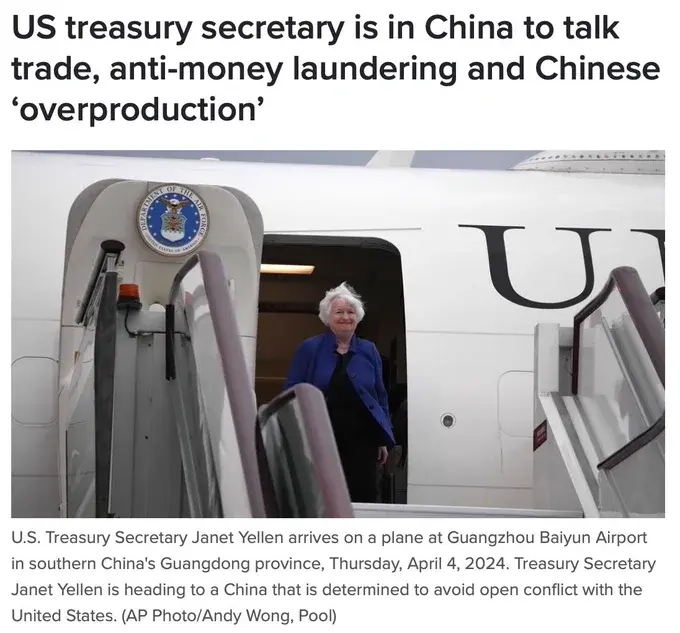A very educational thread addressing this article headline:
“US treasury secretary is in China to talk trade, anti-money laundering and Chinese ‘overproduction’”

Here the text in case the link doesn’t work for you or stops working at some point:
The goal of this pressure campaign is to somehow convince China to self-sabotage the foundation of their budding prosperity—their means of production—thereby eliminating the competition.
Why don’t the capitalist countries try to out-compete China on commodity prices instead?
They’ve tried!
But due to decades of offshoring productive capacity and hoovering up their best and brightest minds into the financial and “tech” sectors, regaining a competitive edge will require a lot more effort than simply throwing money at the problem.
In the lead up to Yellen’s visit, western pundits have begun calling for China to reorient its fiscal policy away from direct subsidy of domestic industry and toward a western model of social welfare spending and imports; essentially, to treat symptoms instead of the disease!
The disease is, of course, capitalism itself. And at the core of the capitalist mode is commodity production.
Since China’s economy is undoubtedly still dominated by commodity production, it is easy to see this as de facto proof that China’s model is not socialist.
But history has shown that commodity production is a historical stage that must be progressed through, not simply a policy that can be abolished by decree.
So how is China progressing from this ‘lower’ stage of socialism toward a ‘higher’ stage?
By undercutting imperialism, the core of global capital’s political power.
The beating heart of imperialism is monopoly-like control of the global economy, which is why China’s sovereign command of critical global commodities poses an existential threat to the imperialist order.
In response, the US is crying out “slave labor!” in unison across virtually every sector; from clothing, to vehicles, to phones.
In reality, China’s commodities aren’t cheap because of a surplus of labor, but because of a ‘lack’ of it!
As anyone with experience manufacturing in China during the past two decades can attest, plummeting commodity prices are due to a rapidly surging level of automation.
This increasing automation leads to a decrease in the embodied labor within each commodity.
In capitalist countries, the decline in embodied labor erodes the whole basis for profit, and is thereby a major cause of the pattern of recurring market crashes and economic crises.
But in China, “overproduction” isn’t ultimately measured against the market’s demand for profit, but by societal need.
China’s recent reigning-in of their housing “glut” (without a single person being made homeless) was a great demonstration of this principle in action.
The only reason China (or any socialist country) is able to make steady progress toward resolving the set of shifting contradictions they face is because the political power of capital has been subordinated to the political power of the party, the vanguard of the working class.
But in truth, there is no set formula for developing a ‘modern socialist country with common prosperity’.
Marx provided only a strategy of navigation, not a roadmap.
China must navigate themselves and “cross the river by feeling the stones”.
One of the stones that has consistently guided China is ‘hard work’, a value that is integral to China’s national identity.
And with the amount of industrial catching-up the west has to do, it will eventually need to become part of ours as well.

